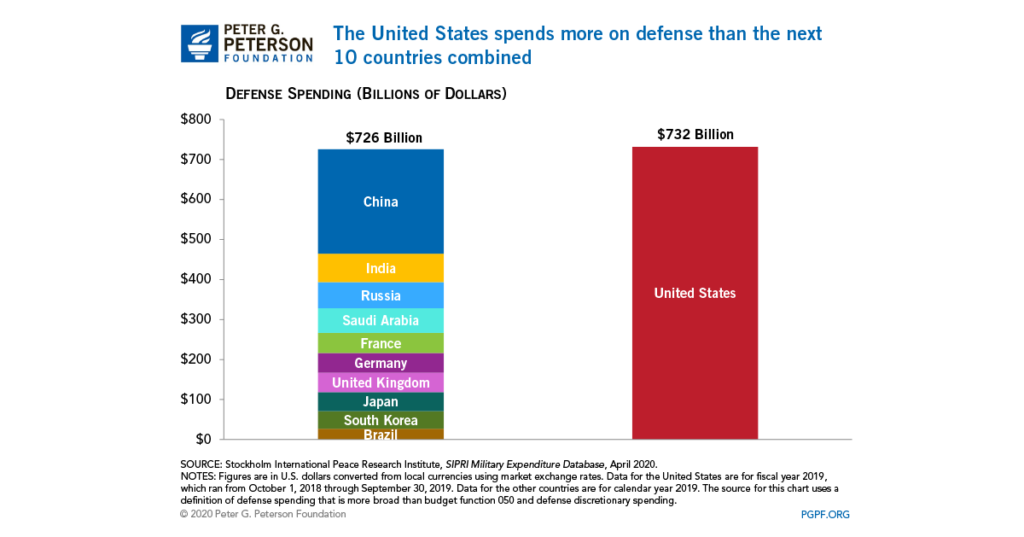“And when we talk about real change it is incredible to me the degree to which Congress continues to ignore our bloated $740 billion defense budget—which has gone up by over $100 billion since Trump has been in office.”
The Senate passed the National Defense Authorization Act allocating $740.5 billion to the defense budget while including a plan to rename bases named after Confederates. This comes after voting down Senator Bernie Sanders’ proposed 10% cut in defense funding.
The vote was passed this Thursday 86-14 after the House passed the annual NDAA days earlier. The bill allocated $536.4 billion to the Pentagon, $25.9 billion towards national security within the DOE, and $59 billion for the Overseas Contingency Operations account.
During a pandemic where unemployment claims have risen by 50 million, and our greatest national security threat is COVID-19, the Senate is focusing its efforts on lining the pockets of the defense contractors. While people face evictions, job losses, hunger, and the country a 45% potential increase in homelessness, we’re focused on continuing to inflate the military budget unnecessarily.
An Increased Military Budget
Since Trump came into office, he has increased defense spending by 100 billion — 20% more than Obama. A simple 10% cut could free up $74 billion to help Americans. While it is true that our large budget ranks number one due to higher costs of living, substantial cuts can be made. The United States spends more on national defense than China, India, Russia, Saudi Arabia, France, Germany, United Kingdom, Japan, South Korea, and Brazil – combined. The current U.S. budget exceeds China’s military spending by 3-1 an Russia’s by over 10-1. It acounts for 15% of all federal government spending and 3.2% of GDP. It makes up over one-third of all global military spending, and three times that of military power China.
For FY2019, the Department of Defense’s budget authority was $693,058,000,000.
- Military Personnel (No MERHFC)$143,198
- Operations and Maintenance $278,803
- Procurement $147,287
- RDT&E $95,253
- Revolving and Management Funds $1,656
- Defense Bill (No MERHFC) $666,197
- Medicare-Eligible Retiree Health Fund Contribution (MERHFC) $7,533
- Department of Defense Bill Plus MERHFC $673,730
- Military Construction $9,688
- Family Housing $1,565
- Military Construction Bill $11,253
- Total Base + OCO + Emergency (DoD Record) $684,985
- Total DoD Mandatory (DoD Record) $8,073
- DoD Total $693,058
Proposed Cuts
Experts have proposed a few cuts that save us $40 billion. Instead of increasing nuclear spending programs by 17% to $50 billion, reductions can be made in this area. The Pentagon also acknowledges that $25 billion is wasted every year. A few more cuts can help the government reduce its superfluous military budget by about $40 billion.
However, Senator Sanders’ proposal went further by calling for a feasible 10% cut that could be invested in education, healthcare and anti-poverty programs. The vote failed, because investing in an educated and healthy citizenry more capable of working and growing the economy is too much to ask for for corporatist congressmen and women.
Sen. Bernie Sanders: “If the horrific pandemic we are now experiencing has taught us anything, it is that national security is not just building bombs, missiles, jet fighters, tanks, submarines, nuclear warheads and other weapons of mass destruction.”
The Military Industrial Complex
Sanders concluded, “And as President Eisenhower said as he left office in 1961: ‘In the councils of government, we must guard against the acquisition of unwarranted influence, whether sought or unsought, by the military industrial complex. The potential for the disastrous rise of misplaced power exists and will persist.’”
Even Eisenhower, facing a Soviet threat urged for us to balance defense with diplomacy.
Eisenhower: “We must learn how to compose differences not with arms, but with intellect and decent purpose.”
The U.S. military hasn’t fought for our “freedom” since WWII, instead focused its efforts on interventionist regime change wars that have overthrown democratically elected governments, bolstered authoritarian oppressive regimes in Latin America and the Middle-East. Then, absolved itself of the responsibility of the suffering inflicted by those regimes. Has the defense budget fought for our freedoms in its overthrow of democratically elected governments in Iraq, Iran, Guatemala, Haiti, Paraguay, Chile, Iran, and Nicaragua? Or was that just part of the military industrial complex Eisenhower warned about in protection of the “Open Door” economy?
Performative legislation results in surface-level reforms such as name-changes while preserving the oligarchy’s stranglehold on the working-class –on the investment and growth of the economy — through a focus on a military budget that has increased by 100 billion since Trump took office.







Leave a Reply